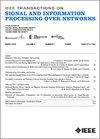Distributed Generalized Nash Equilibria Computation of Noncooperative Games Via Novel Primal-Dual Splitting Algorithms
IF 3
3区 计算机科学
Q2 ENGINEERING, ELECTRICAL & ELECTRONIC
IEEE Transactions on Signal and Information Processing over Networks
Pub Date : 2024-02-09
DOI:10.1109/TSIPN.2024.3364613
引用次数: 0
Abstract
This article investigates the generalized Nash equilibria (GNE) seeking problem for noncooperative games, where all players dedicate to selfishly minimizing their own cost functions subject to local constraints and coupled constraints. To tackle the considered problem, we initially form an explicit local equilibrium condition for its variational formulation. By employing proximal splitting operators, a novel distributed primal-dual splitting algorithm with full-decision information (Dist_PDS_FuDeIn) is designed, eliminating the need for global step-sizes. Furthermore, to address scenarios where players lack access to all other players' decisions, a local estimation is introduced to approximate the decision information of other players, and a fully distributed primal-dual splitting algorithm with partial-decision information (Dist_PDS_PaDeIn) is then proposed. Both algorithms enable the derivation of new distributed forward-backward-like extensions. Theoretically, a new analytical approach for convergence is presented, demonstrating that the proposed algorithms converge to the variational GNE of games, and their convergence rates are also proven, provided that uncoordinated step-sizes are positive and less than explicit upper bounds. Moreover, the approach not only generalizes the forward-backward splitting technique but also improves convergence rates of several well-known algorithms. Finally, the advantages of Dist_PDS_FuDeIn and Dist_PDS_PaDeIn are illustrated through comparative simulations.通过新颖的原始-双重分割算法计算非合作博弈的分布式广义纳什均衡点
本文研究了非合作博弈中的广义纳什均衡(GNE)寻求问题,在这种博弈中,所有博弈者都致力于在局部约束和耦合约束下自私地最小化自己的成本函数。为了解决所考虑的问题,我们首先为其变分公式提出了一个明确的局部均衡条件。通过使用近似拆分算子,我们设计了一种具有完全决策信息的新型分布式原始-二元拆分算法(Dist_PDS_FuDeIn),从而消除了对全局步长的需求。此外,针对玩家无法获得所有其他玩家决策的情况,引入了局部估计来近似其他玩家的决策信息,然后提出了具有部分决策信息的完全分布式原始-二元分裂算法(Dist_PDS_PaDeIn)。这两种算法都能推导出新的分布式前向后向类扩展。从理论上讲,本文提出了一种新的收敛分析方法,证明了所提出的算法可以收敛到博弈的变分 GNE,而且只要非协调步长为正且小于明确的上限,它们的收敛率也得到了证明。此外,该方法不仅推广了前向后拆分技术,还提高了几种著名算法的收敛率。最后,通过对比模拟说明了 Dist_PDS_FuDeIn 和 Dist_PDS_PaDeIn 的优势。
本文章由计算机程序翻译,如有差异,请以英文原文为准。
求助全文
约1分钟内获得全文
求助全文
来源期刊

IEEE Transactions on Signal and Information Processing over Networks
Computer Science-Computer Networks and Communications
CiteScore
5.80
自引率
12.50%
发文量
56
期刊介绍:
The IEEE Transactions on Signal and Information Processing over Networks publishes high-quality papers that extend the classical notions of processing of signals defined over vector spaces (e.g. time and space) to processing of signals and information (data) defined over networks, potentially dynamically varying. In signal processing over networks, the topology of the network may define structural relationships in the data, or may constrain processing of the data. Topics include distributed algorithms for filtering, detection, estimation, adaptation and learning, model selection, data fusion, and diffusion or evolution of information over such networks, and applications of distributed signal processing.
 求助内容:
求助内容: 应助结果提醒方式:
应助结果提醒方式:


